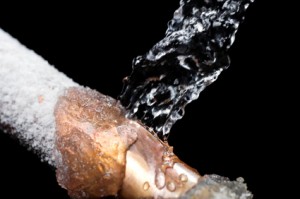Why Pipes Freeze in Germantown Homes
By Wilmer Romero on Jan 31, 2013 in Sewers & Drains
Knowing how & why Pipes Freeze Can Spare You
Aggravation & Expensive Repairs.
Pipes stay warm and the water flowing through them keeps flowing only for as long as the air around them remains above freezing. If the air freezes, look out inside! Because once the water freezes, the ice that forms inside your pipes can prevent water flowing to your faucets. Worse yet, your pipes can burst, thus causing a mess at the very least, and expensive repairs and water damage at the extreme.
The pipes most likely to freeze are those in unheated spaces. Pretty obvious, right? Well, what’s not so obvious is when and if you have in unheated spaces that you’re not aware of and just can’t see. Say, for example, under your garage floor, outdoors, or in your crawl spaces. Even pipes inside your cabinets are at risk should the temperature be set too low or your heat turn off. If that happens, open all your cabinet doors so that whatever heat is left can reach them, too.
Here’s something else to consider. If you have an older home and pipes are located inside the exterior walls, they’re probably fine as heat can and will penetrate your walls to provide just enough heat to keep the water flowing. But if you were to suddenly add insulation inside those same walls, guess what? Now you’re keeping all the heat indoors and leaving those pipes at the mercy of outdoor temperatures.
Galvanized steel pipes, the most common type, are also the most likely to freeze and burst. Copper can usually withstand at least one freezing episode and subsequent pipe thawing. But the best protection, nothing beats PVC water pipes.
Here’s How to Prevent Freezing in Germantown and Montgomery County
Follow these simple prevention measures and you’ll have one less reason to call a professional plumber. You have several options, some of which you can combine:
- Don’t turn your thermostat below 60°F.
- If pipes run under your attached garage, keep the door closed.
- Insulate exposed pipes with foam tubing. They’re slit on the side to make it easy to do this on your own.
- Another way to insulate pipes is with electric heating cables that neatly wrap around the pipes which you would then secure with tape.
- If you’re expecting frigid temperatures overnight and you KNOW you have un-insulated and exposed pipes, turn on one of your faucets just a little to keep the water flowing.
- If you undertake a remodeling job, hire a plumber to relocate any exposed pipes to a warmer location.
At Your 1 Plumber, we’re all about helping you avoid unnecessary plumbing expenses. If you’re the handy type, don’t wait for the next freeze before taking action. If you want professional help, call us any time to prevent frozen pipes from creating a big headache and a possibly bigger repair bill.
Toll free: 1-888-540-7586
Click here to schedule service now

Post a Comment
You must be logged in to post a comment.